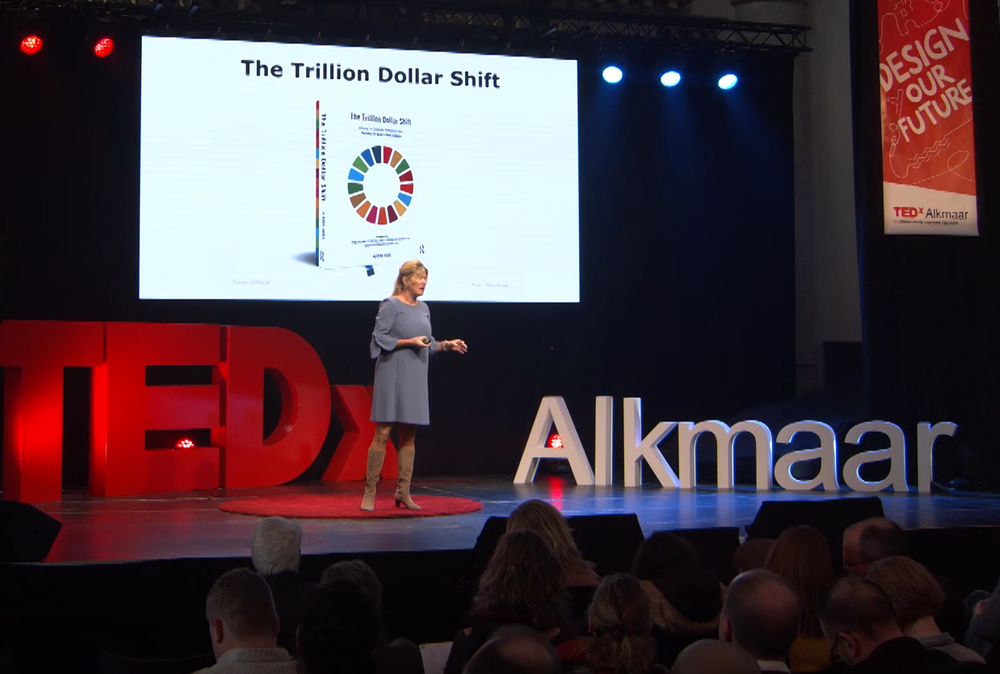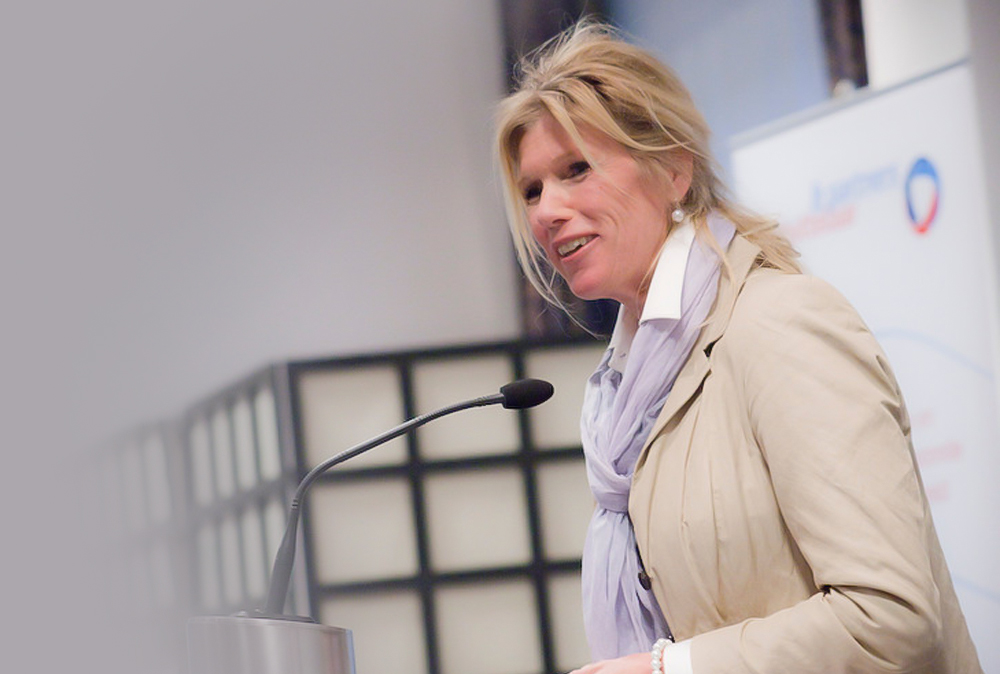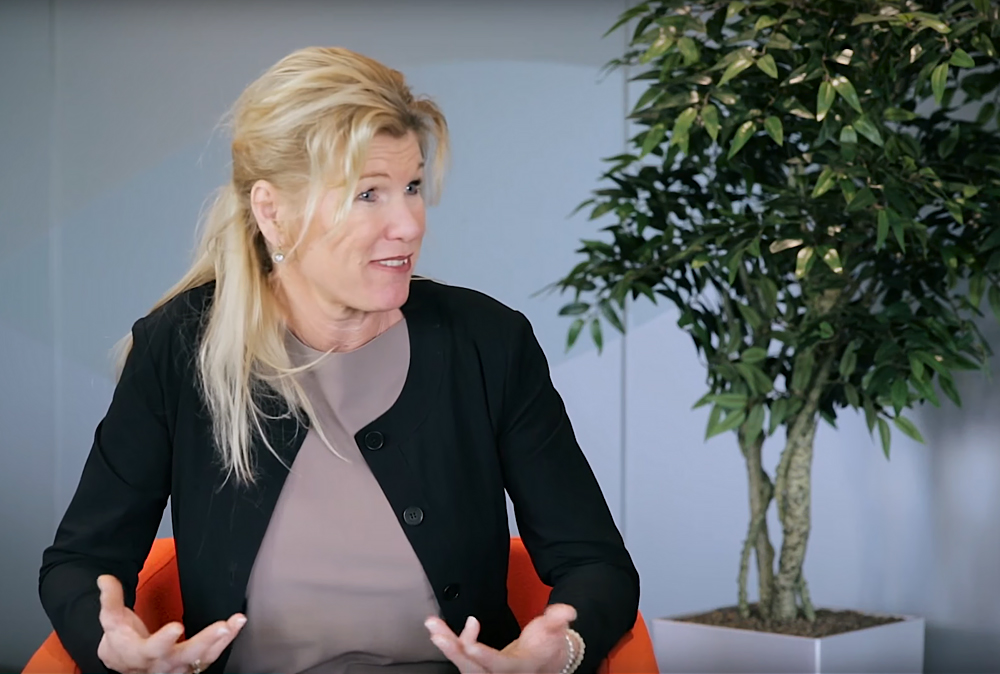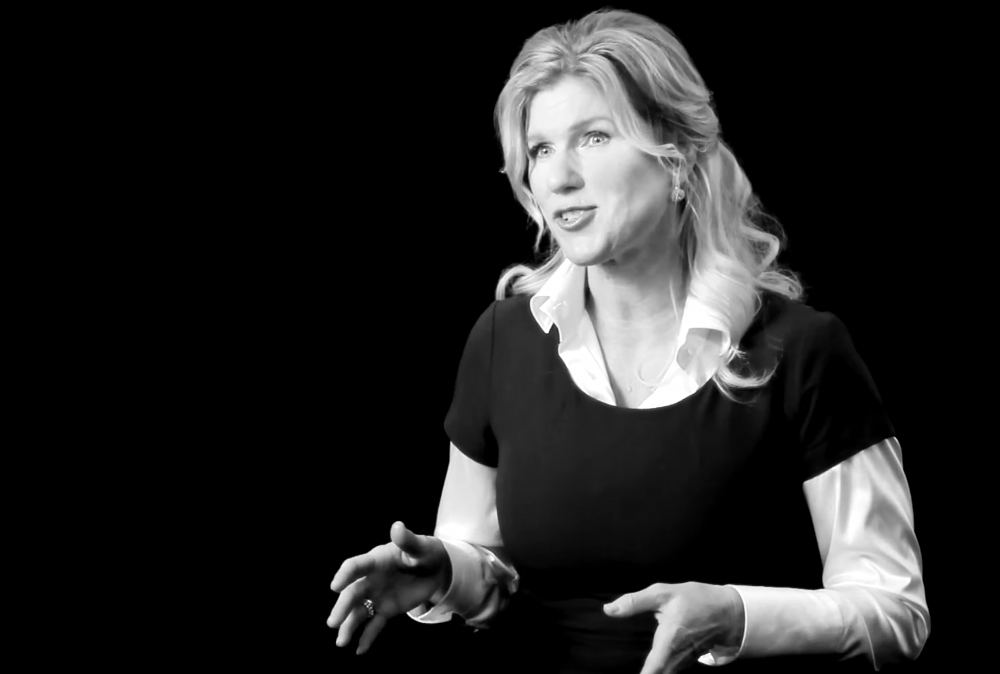Marga Hoek is a visionary, international figurehead recognised for her ongoing thought and business leadership on sustainable business and capital. Ms Hoek is an authoritative and inspirational speaker, able to take society’s major challenges at hand and sketch concrete paths to success. Because of her work the Thinkers50 has incorporated her into their 2019 list. She is the author of the award-winning books The Trillion Dollar Shift and New Economy Business as well as numerous articles in magazines such as The Huffington Post, Executive Finance, Salt and G7 Climate Change.
Marga has a strong track record as a business leader. She has been CEO of multiple private and public companies and founded and was CEO of the Dutch Sustainable Business Association until 2016. She holds several international Advisory and Board positions in which she has impact on business, science and capital. She founded Business for Good, a Foundation supporting innovative solutions for the SDGs to scale up. Her positions include Member of the Advisory Council on Responsible Investment of the Bank of Montréal, Chairman of the Sustainable Science Association, Partner of Chairman Mentors International and Vice-Chairman of the Supervisory Board of Mazars Accounting.
-
Sustainable Business and Capital
-
Sustainable Development Goals
-
The Role of Business Leaders for Society
-
New Markets and Innovation Opportunities
-
Current CEO and Board Challenges
-
Global Outlook on Societies and Business’ Challenges
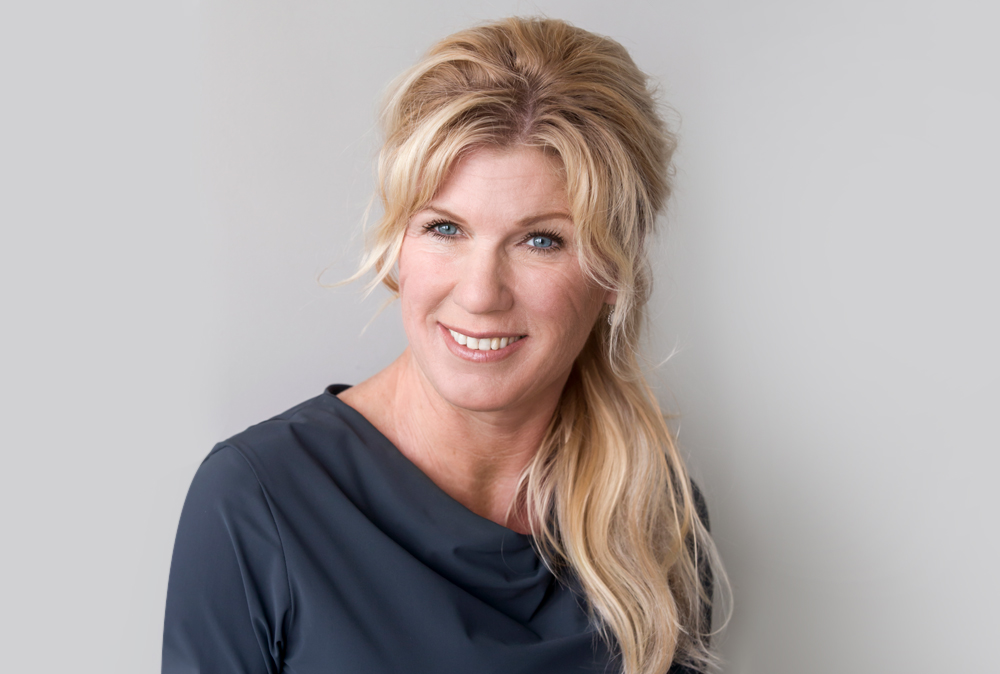
Interview
You bring all angles of sustainability together in an amazing way: can you see a day in the near future when sustainability is the default setting for society and business?
Yes, definitely. Imagine that sustainable brands by now grow twice as fast as ‘non sustainable’ brands, that companies that fight climate change perform 20% better than their peers, that investors have discovered that purpose driven companies are a better investment and that already 63% of consumers prefer, even with a slightly higher price, to buy from sustainable companies. So the shift is happening and the speed will grow significantly and quickly – even more so since the next generations; millennials and generation Z, will accelerate this shift. 88% of millennials simply want to work for a purpose-driven company and in 2025, they will account for 75% of the workforce!
At the same time, we progress too little at too little scale. We need to step up and scale up. So this shift is really needed.
How important do you believe strong leadership is to successful business in these ever more challenging times?
Leadership is key. And purpose-driven leadership is still scarce. Most leaders are still too unaware of their impact, the new markets that are simply out there if we are willing to open a new door. And they still do not realise that sustainable leadership means being and feeling responsible for not only your company, not even just your business sector, but the world and society as a whole. We have great examples of leaders that do just that like Feike Sijbesma, Paul Polman and Gerard Mestrallet, but we need many more and successors for them!
How can you convince corporations that doing business for good is actually going to do good for their business?
By making them aware of the new market opportunities, of the business case of sustainable solutions. Let the numbers speak for themselves! I encourage them to make the business case, and to scale it up. I do not say it can be good for their business, I say it must be good for their business!
How can businesses and governments be encouraged to work more closely together to help solve our most pressing social and environmental challenges?
They actually work closely together; developing the SDGs was a joint endeavour for instance. But, the ‘new social contract’ demands a much more intensive and also a ‘wiser’ collaboration. Businesses and governments must be aware both have to work with the bigger picture in mind: adapting tax systems, regulation and public/private partnerships will mean shifting more quickly at a much greater scale.
Carbon tax is one of the major things to achieve; by internalizing externalities sustainable business cases will be in general 45% more profitable as compared to now. Simply, since we do not put a price on our resources and pollution. Government and business need to achieve this change together.
What do you think is the biggest threat facing the global economy today and what can be done to face this and to create opportunities for business?
Poverty, climate change and food are the biggest challenges. And obviously they are intertwined. Climate change hits the poorest people the hardest. And food loss hits the struggling smallholder farmers in developing countries. Private investment accounts for 90%; so the private sector holds the key. If the private sector invests in all business solutions and investments that address the SDGs, we can create a huge shift, very quickly together.
Imagine that our global food waste accounts for over 1/3 of all food produced, meaning over 780 billion dollar a year. At the same time, we need ‘only’ 80 billion a year to feed all. Imagine then that obesity kills more people then hunger does. So you know, this can be solved. Imagine that only two minutes of sunlight equals all the energy used on the planet of two years. So we need only to unlock all the business solutions, making use of that sunlight instead of fossil reserves.
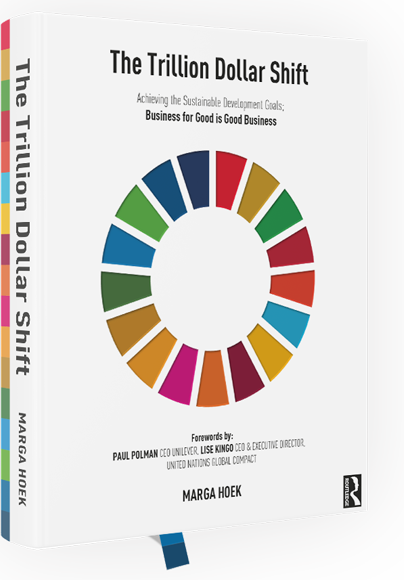
The Trillion Dollar Shift (2018)
The book’s production and the book’s content go hand in hand: in The Trillion Dollar Shift, Hoek sets out to explain how business and capital have the responsibility, and opportunity to create sustainable value, and contribute to the solving of global challenges, using the UN Sustainable Development Goals (SDGs) as a framework. Working towards these SDGs is not just a goal on its own, by doing so tremendous opportunities and new markets become available. As Hoek states: “Business for good is good business”.
Read a recent article about The Trillion Dollar Shift, highlighting why this book matters so much.
“I firmly believe both business and capital can and should play a significant role in solving our global challenges.”
“Technology is a driving force behind innovation, connectivity and productivity in nearly every sector.”
The Decade of Sustainability
Sustainable business in the 2020s
We are about to enter not only a new year, but a new decade as well. A decade in which sustainable business and capital will develop and grow in an unprecedented way. Throughout the 2010s, technology has proven to be the definite game-changer. This will continue in the 2020s, yet the perspective will be from society at large, as the shift to sustainable business and capital will no doubt be the most significant shift of the next decade.
It is absolutely vital that business and capital use technological means to make this shift to sustainability. The numbers tell us that business will fail in a world that is falling apart due to climate change, resource scarcity, lack of drinking water and growing inequality. Public concern on the impact of climate change is growing rapidly and rightfully so. The whole point of setting the Sustainable Development Goals for 2030 is that with this deadline in place, we will aim to achieve them in time to safeguard a functioning and lasting world and economy. Since we adopted the goals in 2015, there has been much preparation. The next ten years will have to be a period of action, rather than words.
Business for good is good business
Business and capital should also want to achieve the Goals. The Sustainable Development Goals offer tremendous new market opportunities, 12 trillion dollars till 2030 to be precise. The Goals also inspire new ways to relate to customers and employees, build company reputations, and trigger organizational agility. They also write the roadmap on how to become and stay relevant in the market and the economy.
Being on the forefront of sustainability during the next decade will mean being on the winning side of business. This can be done with a positive business case: business for good is in fact good business, like the title of my book The Trillion Dollar Shift states. So, what are the emerging trends for companies to build on throughout the 2020s?
The millennial and Gen Z consumers will drive change in the 2020s
Sustainability will become much more important to big and small companies in the year and decade ahead, as new generations become the largest portion of both consumer and workforce markets. Millennials are already a large proportion of the consumer and labor markets, and they have noticeably started to be a driver for sustainable change. They demand purpose-driven companies as employees, are willing to pay more for sustainable products, and do not accept non-sustainable practices from companies. Generation Z, entering the workplace and consumer market right after them will continue to demand action. A recent McKinsey study showed that 90% of Gen Z expects brands to take a responsible approach to societal issues. Companies will have to get a move on if they want to become and stay relevant. Millennials and Gen Z together already account for 350 million US Dollars in spending and this figure is growing. Companies will need to respond rapidly and at scale to the major changes ahead in workforce and consumer demands.
Technology for good
Technology is the biggest accelerator for sustainability in the 2020s, or at least it should be. Smart companies are already aware that they should use technology to drive sustainable change. In the next decade, every company, regardless the sector, needs to go tech. Small and big data, robotics, AI, drones and other innovative technologies offer new pathways to sustainability as well as business opportunities. Technology creates a hyper transparent future since it is driving new possibilities and expectations for real time tracking, measuring and decision making around the globe. Thus, these new technologies are crucial for transforming supply chains, products and services as well as the way companies communicate and interact with clients and stakeholders. We will need to rely on technological innovation to enable us to beat climate change by inventing and scaling electric vehicles in ways that haven’t been effectively addressed yet, like trucks, ships and airplanes. By inventing cheap as well as long-term storage solutions, accessible solar power, carbon capture and storage, and hydrogen solutions, the companies with technological solutions will thrive, and so will our planet.
Circular economy for real
The 2020s will compel a major shift toward a circular economy. For companies, incremental changes in the supply chain will no longer suffice. Supply chains will need to be redesigned and reinvented as technology enables the transformation and the new generations demand it. Anti-plastic sentiment is already higher than ever before and will translate into a major change. The UK Plastics Pact for instance, with a roadmap to 2025, demonstrates the change ahead. And it is a crucial change, considering that inaction means there would be more plastics in the sea than fish by 2050. In the next decade, governmental policies and tax systems will have to change to support recycling rather than frustrating it and to put a, right, price on carbon and resources. Even without these changes, consumers will demand more recycled packaging and sustainable supply chains. Consumers will insist upon a no waste policy which will necessitate a fresh perspective on how we do business, and will require the bold move to a real circular economy.
The investment shift
As in the next few years the growth of the concern on climate change will accelerate, regulatory pressures will increase as well as the demands for corporate companies to disclose climate and other ESG related risks, the impact of sustainability on investments will see a tremendous growth of the next decade. From the risk side, there is a need to. The above creates a what we call transitional risk, a risk that results from policy, legal, technology and market changes. On the opportunity side, it becomes increasingly clear they do not underperform but outperform ‘mainstream’ investments and thus, there is a business reason to shift. Last but not least the new generations demand sustainable investment, banking and mortgage products and services and thus will drive change throughout the financial sector.
The 2020s will be the decade of sustainability. It will mean adapt and thrive, or deny and die. It is literally the tip of the iceberg we see now. The future of all of us and thus of business relies on our joint ability to transform. Tackling the challenge means new opportunities for growth, innovation and resilient investments. We are entering not only a new year, but a new decade. The decade of sustainability.
“In the new economy businesses create ecological, social and financial value.”
“We need a new type of leadership, matching the needs of a network-based society.”
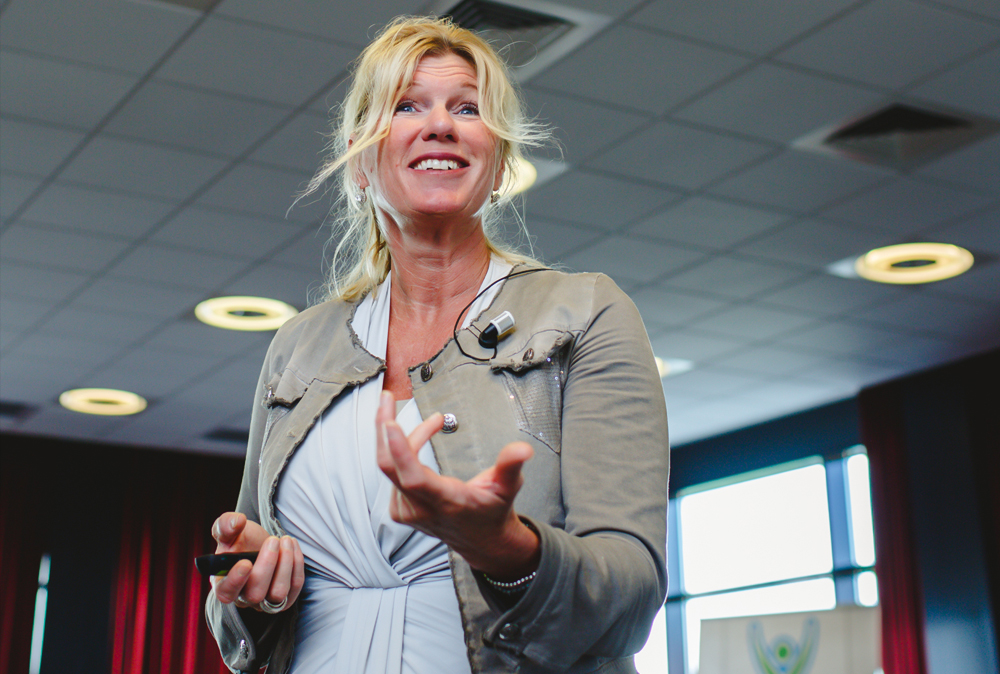
To book Marga Hoek
Ms Hoek is known to be a visionary, but with a close eye on reality. She combines sharing her vision with many concrete examples of exciting business cases throughout the world. Marga can engage and relate with many different audiences, in many different countries and provides the right mix of information, humour and inspiration.
If you would like to book Marga Hoek for your next event, please call Dagmar O’Toole on +44 1628 601 462 or send an email to dagmar@csaspeakers.com.

